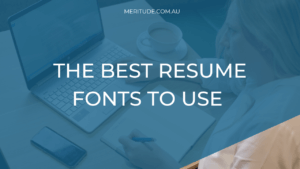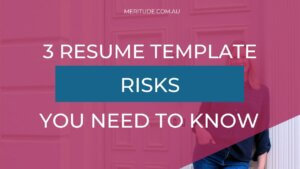Seems strange writing a post on why professionals need a resume. After all, it’s the first thing people think of when they’re looking for a job. But there are many other reasons why you might want to put together a resume now, even if you’re not actively seeking new employment.
Key Times You’ll Need A Resume
#1 Employer Situation Changes
The thing is, your employment situation can change in a heartbeat. Mine has throughout my career. The company you so faithfully devote most of your life to may be acquired, or sold, or go out of business (overnight). Your amazing boss may leave for a new position — and maybe he/she wants you to come with him. Or maybe his replacement wants to bring in his own people and all of sudden your left out in the cold.
#2 Sudden Interview
Then there is the interview you’ve scored suddenly when a friend has recommended you for a role. The recommendation might have been strong enough to by-pass sending a resume before you meet, but during that interview, you’re going to need to hand a well-organised, neatly formatted document to the hiring manager.
#3 Employer Request
Your current employer may even request a resume from you (yes, it can happen) — for example, to include in a proposal the company is preparing for a new contract. It’s not uncommon for key personnel bios to be included in a response to a Request for Proposal (RFP) or applications for grants.
#4 Promotions & Transfers
Let’s not forget that internal promotion or transfer that pops up when you were least expecting it. The internal recruiter or hiring manager will need to know about the specific contributions that you’ve made in your current role.
#5 Speaking Engagements
Outside of an employment context, you may also be asked for a resume if you’re going to be a speaker for an organization or an event, so they can use the resume to create your bio and speaker’s introduction.
#6 Political Appointments
Individuals being considered for a political appointment — for example, a state government committee or board — will likely be asked for their resume. The same is true for individuals being considered for key volunteer roles — for example, if you are asked to be on a nonprofit’s board of directors.
#7 Awards & Recognition
You may also be asked for a resume if you are being considered for an award — or being given an award in recognition of your work or volunteer efforts.
#8 Networking
Resumes are also a tool for networking. Someone you just met who is interested in learning more about you may ask for your resume. This contact may help lead you to unadvertised job openings. In the same way, getting your resume in the hands of someone who knows you well can also lead to new opportunities. They can use your resume to pass along to other people who might be in a position to hire you, or to use as a “door opener” to introduce you to other people who might be useful in your job search.
#9 Self-Marketing
Here’s one you might not have thought of before. Your resume can also be used as a tool to market yourself. If you work in a service-oriented position, your skills, education, and expertise are a critical part of what makes you credible to potential clients. Having a resume — or a bio based on your Resume — that communicates why you are a good choice to provide the service can help fill your appointment book, especially for therapists, clinicians, coaches, and teachers. A document that showcases your credentials can be an important part of your company or practice’s marketing materials.
#10 Scholarships, Internships & Work Experience
Resumes are important at any age. A Resume can be a good resource for high school applying for scholarships and to include with university applications. It can be updated throughout the university career for internships and part-time jobs. And, of course, once you graduate from university, you’ll likely need a resume to apply for your first job.
#11 Headhunting
Your skills, experience and accomplishments might be in high demand and it’s not uncommon for professionals to be contacted by competitors — or recruiters working for competitive companies — looking to hire you.
#12 Career Planning
Putting together your resume can also help you determine where you want to go next in your career. Sometimes, just by looking at your work history, you can identify patterns in your employment history and transferable skills that will help you determine where you want to go next in your career or your future potential.
The same exercise can also help you identify where you may need to enhance your current skills or education. If you’re putting together your resume and you realise your last certification or in-depth training was more than 10 years ago, it may prompt you to look at how you can bring your skills up-to-date in a key area.
Having your Resume prepared by a professional Resume writer can also provide you with a sense of how you are seen by others. A third-party validation of your accomplishments — put together in an attractive, easy-to-read, modern format — can give you confidence. It can also provide reassurance that you have marketable skills and that you would likely land on your feet should your current position be eliminated.
Why You Need To Update Your Resume Now!
So, if I don’t need a resume right now, why bother creating, maintaining or updating one?
Simple! It takes time to put a good resume together — whether you’re writing it yourself, or having a professional prepare it for you.
Your resume is not just an “obituary” of your work history — it’s not a summary of everything you’ve done — it’s a strategic marketing document that showcases your value to a prospective employer.
It’s far easier to maintain a resume than to scramble to put one together, especially when a new opportunity arises and you need to give someone your resume on short notice.
The number of professionals who come to me last minute needing a resume because a recruiter has reached out or you’ve suddenly seen the job of your dreams is a constant. Trying to pull one together last minute never works well. Most people end up with a half-baked document that doesn’t sell them properly.
So, if you don’t have a resume now is the time to get one; and if you have one, but it hasn’t been updated in a while, now is the time to bring it up to date.
You never know when you might need your resume, and you want it ready when you do.





